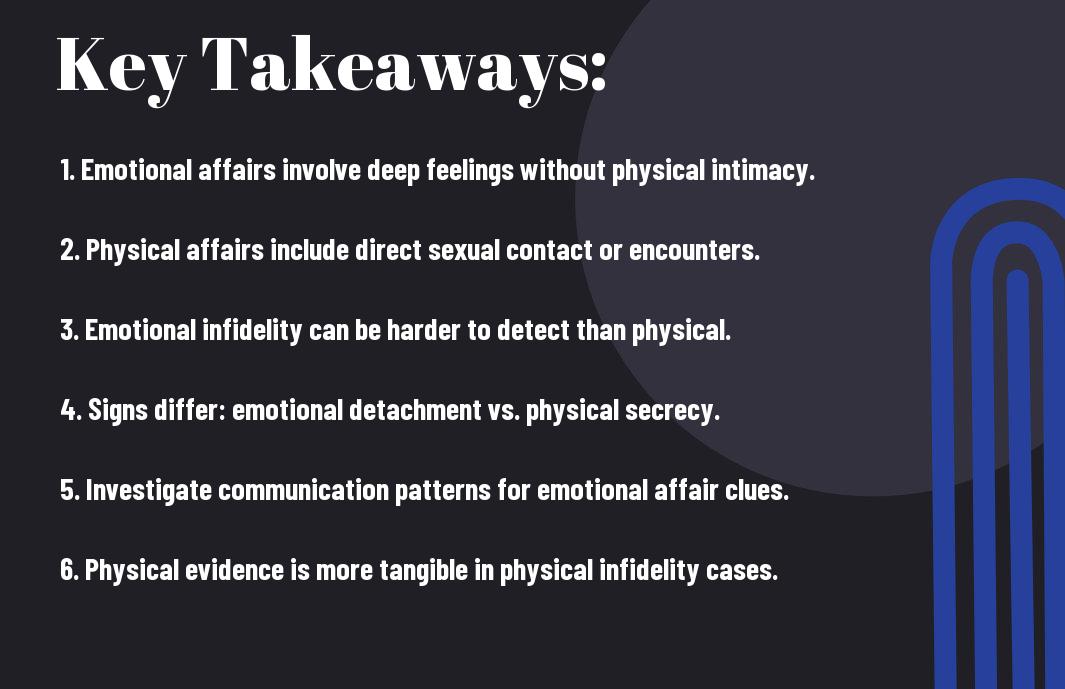Just as relationships can take many forms, so can the betrayals within them. Understanding the difference between emotional and physical affairs is vital for you to effectively navigate the complexities of infidelity. Each type carries its own set of challenges and implications for your relationship. In this post, you’ll learn how to identify the signs of both emotional and physical infidelities, and the best approaches to investigate them should you suspect a breach of trust. This knowledge will empower you to address the situation with clarity and confidence. Contact our specialist at Digital Forensic Squad for clarifications on recognizing the types of infidelity in your relationships.
Key Takeaways:
- Understanding the distinction between emotional and physical affairs is imperative, as each types of infidelity can have different underlying motivations and impacts on relationships.
- Investigating signs of infidelity requires careful observation of behavioral changes, communication patterns, and emotional connections between partners.
- Open and honest communication is vital when addressing suspicions of infidelity, as it can lead to greater clarity and potential resolution within the relationship.
Understanding Infidelity
Before exploring the subtleties of emotional and physical affairs, it’s crucial to grasp what infidelity means in the context of relationships. Infidelity can manifest in various forms, deeply impacting emotional well-being, trust, and intimacy. Recognizing these forms helps you understand the dynamics at play in your relationship and informs how you might respond to signs of infidelity.
Defining Emotional Affairs
Below, you’ll find that emotional affairs are characterized by a deep emotional connection with someone outside of your primary relationship. This often involves sharing personal thoughts, feelings, and experiences that you don’t share with your partner, leading to a bond that can be more challenging to detect than a physical affair.
Defining Physical Affairs
On the other hand, physical affairs are typically defined by sexual intimacy with someone who is not your partner. These encounters can vary in intensity and duration, but they often represent a breach of trust and commitment in your relationship.
To examine deeper into physical affairs, it’s important to understand that they often evoke strong emotional reactions and can disrupt your sense of trust and security. Engaging in sexual activities with another person typically signifies a level of disconnection in your primary relationship. Identifying the motivations behind physical infidelity can provide valuable insights into underlying issues. By recognizing these patterns, you can more effectively address the challenges within your relationship.

Signs of Emotional Infidelity
Even the smallest changes in behavior can signal emotional infidelity. If your partner suddenly becomes more secretive, emotionally distant, or preoccupied with their phone, these may be indicators that they are forming a deeper connection with someone else. Pay attention to shifts in communication patterns and feelings of intimacy, as these may highlight concerning behaviors that could signify emotional betrayal.
Emotional Disconnect
Infidelity often manifests through emotional disconnection in a relationship. If you notice that your partner is withdrawing from shared experiences, showing less interest in your feelings, or lacking enthusiasm in conversations, it could be a sign that their emotional investment has diminished. This disengagement can lead to feelings of loneliness and uncertainty, further deepening the disconnect between you.
Secretive Communication
An increased level of secrecy regarding communications is another telling sign of emotional infidelity. If your partner suddenly becomes protective of their phone or computer, frequently deletes messages, or takes calls in private, these behaviors may indicate that they are engaging with someone outside of your relationship. Transparency in communication is key to trust; noticeable shifts in how your partner interacts with their devices can be very concerning.
Also, consider how often your partner spends time on messaging apps or social media platforms. If those interactions seem to dominate their free time and they’re reluctant to share details, it can point to an emotional investment elsewhere. You might find that conversations become superficial or focused on mundane topics, leading to feelings of exclusion or suspicion. It’s vital to evaluate these signs and discuss your feelings with your partner to address any underlying issues that may arise from this secretive communication.
Signs of Physical Infidelity
Keep an eye out for changes in your partner’s behavior, as these can be significant indicators of potential physical infidelity. Sudden shifts in routine, emotional distance, or even an increase in grooming and attention to appearance may suggest illicit involvement. Recognizing these signs is vital in discerning whether your partner may be engaging in an affair, as they often reflect a deeper issue within the relationship.
Changes in Behavior
To identify signs of physical infidelity, you should closely observe any noticeable changes in your partner’s behavior. An abrupt shift in how they interact with you, including avoidance or excessive irritability, could signal that something is amiss. Increased attention to their personal appearance, such as new clothing or a distinct change in grooming habits, may indicate that they are attempting to impress someone else.
Increased Secrecy
Physical signs of infidelity often include increased secrecy around your partner’s actions and communication. This could manifest as discreet phone use, unexplained absences, or an abrupt need for privacy. If you notice your partner frequently hiding their phone or being protective of their digital devices, it may be worth investigating further.
Secrecy can become even more apparent when your partner begins to change their routines, such as taking phone calls in private or going out more without providing clear explanations. This behavior may lead to you feeling uneasy or suspicious about what they are hiding. If you sense that your partner is deliberately excluding you from their life or evading questions, it’s vital to address these concerns openly to gain clarity on the situation.
Motivations Behind Emotional Affairs
Despite common misconceptions, emotional affairs often stem from deep-seated motivations. Your need for connection, understanding, and validation can pull you towards someone outside your primary relationship. In many cases, you might find that the emotional intimacy sought in an affair compensates for perceived deficiencies within your current partnership, leaving a persistent and troubling gap that can lead to infidelity.
Emotional Needs
Below the surface, your emotional needs impact your decision to engage in an emotional affair. When your partner fails to meet those needs, it can create feelings of loneliness and unfulfillment. You may find yourself seeking support and understanding from someone else, mistakenly believing that this connection will fill the void.
Relationship Dissatisfaction
Any signs of relationship dissatisfaction can escalate the likelihood of seeking solace in an emotional affair. You may often feel unheard, unappreciated, or disconnected from your partner. Over time, these feelings can morph into a desire to escape and seek validation from someone who seems to understand your struggles.
And when relationship dissatisfaction festers, it can lead to seeking emotional fulfillment elsewhere. You might feel that your partner is indifferent to your feelings, stirring a strong urge to confide in another person. This yearning for connection can overshadow the complexities of your current relationship, ultimately pushing you towards emotional affairs in an attempt to find the warmth and intimacy that you lack at home.

Motivations Behind Physical Affairs
For many individuals, physical affairs stem from a complex mix of factors, with motivations varying widely from person to person. Understanding these motivations can provide insight into your partner’s behavior, whether it’s a response to dissatisfaction or a deeper desire for connection. Recognizing what drives such actions can be an vital part of addressing infidelity and rebuilding trust.
Sexual Desire
Behind the allure of physical affairs often lies an intense sexual desire that may not be fulfilled within the primary relationship. You may find that your partner seeks out new connections to satiate cravings for passion and intimacy that feel absent at home. This desire can be fueled by emotional distance or changes in sexual dynamics, creating a sense of longing for something more thrilling.
Novelty and Excitement
Affairs often bring a sense of novelty and excitement that can be intoxicating. You may discover that the thrill of new encounters stimulates your partner’s adventurous side, providing a break from the monotony of day-to-day life. This search for excitement can be a significant motivator, as the chance to explore uncharted territory can feel liberating and exhilarating. The desire to experience something new may overpower the commitment established in the primary relationship, leading individuals down a path of infidelity.
In fact, the rush of new experiences can create a temporary escape from routine, allowing your partner to feel alive and desired in ways that may have fizzled in the primary relationship. As they engage in these new encounters, the adrenaline and novelty can produce powerful emotions, often eclipsing the rationale behind their actions. This quest for excitement can signal underlying issues that need addressing within your relationship to prevent future instances of betrayal.
Investigating Infidelity
Many individuals find themselves questioning the fidelity of their partner. Understanding the distinctions between emotional and physical affairs is vital for a comprehensive investigation. For further insights, refer to this article on 3 Different Kinds of Infidelity to guide your exploration into this complex issue.
Gathering Evidence
With a clear approach, you can gather evidence that supports your suspicions. This might involve paying attention to changes in your partner’s behavior, analyzing messages, or noting unexplained absences. Take a practical approach, ensuring you document any signs that could confirm or dispel your doubts.
Importance of Communication
Above all, maintaining open communication with your partner can help clarify misunderstandings and provide insight into your relationship dynamics. Engaging in honest dialogue can often reveal underlying issues.
Indeed, establishing a foundation of trust and transparency is vital for navigating infidelity concerns. Discussing your feelings and concerns openly not only strengthens your bond but may also deter infidelity by addressing issues before they escalate. Encouraging your partner to share their thoughts creates a balanced dialogue, fostering understanding, and minimizing resentment.
To wrap up
From above, you can see that distinguishing between the types of infidelity, i.e emotional and physical affairs is necessary for understanding infidelity in your relationship. By examining the motivations and dynamics behind each type, you can tailor your investigation to uncover the truth. Understanding these differences allows you to address the underlying issues and make informed decisions about your relationship’s future. Whether you are seeking closure or a way to rebuild trust, knowing how to recognize and respond to each type of affair empowers you to take proactive steps toward healing.
Q: What are the key differences between emotional and physical affairs?
A: Theere are mainly two types of infidelity. Emotional affairs typically involve deep emotional connections and intimacy without physical involvement. They often include sharing personal thoughts, feelings, and experiences with someone outside the primary relationship, leading to a bond that can feel very similar to a romantic relationship. Physical affairs, on the other hand, focus on sexual encounters that may or may not involve emotional attachment. These encounters are usually more about physical gratification rather than emotional connection, although some individuals may experience both aspects in their infidelity.
Q: How can one identify if their partner is having an emotional affair?
A: Identifying an emotional affair can be challenging, as it may not manifest in obvious behavioral changes. However, some potential signs include increased secrecy regarding phone use, alibis that don’t add up, and shifts in emotional availability—such as being less communicative or more detached. If your partner suddenly becomes more guarded about their social media or seems to prioritize relationships outside the marriage, these could be red flags. Open communication with your partner can help clarify their emotional state and any changes in your relationship dynamics.


